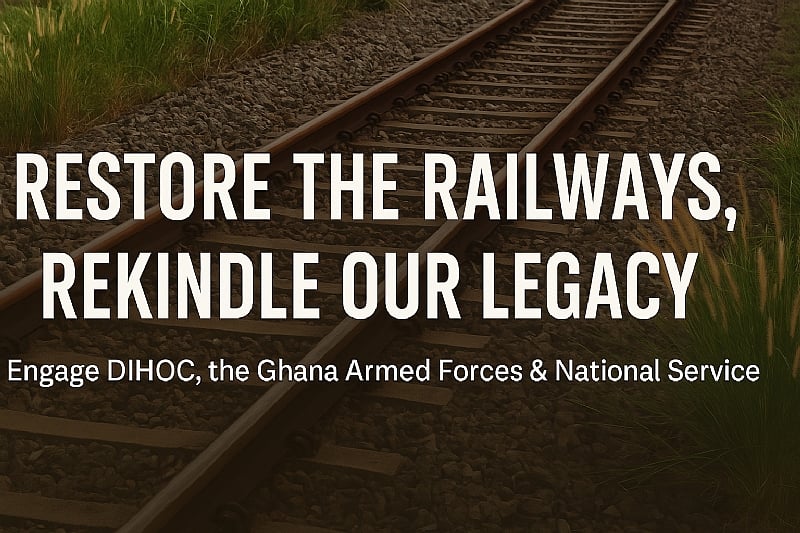Governance Architect and Cultural Steward
🚆Ghana is witnessing a resurgence in disciplined infrastructural stewardship. With the Ghana Armed Forces and DIHOC leading major road projects like the Awaso–Takoradi Bauxite Corridor and the Accra–Kumasi Expressway, the time is ripe to extend this institutional capacity to one of our most neglected national treasures: the railway network.
🛤️ Strategic Rail Corridors Worthy of Urgent Investment
Our railways are more than old tracks—they are dormant arteries of interregional commerce, historical memory, and economic transformation. Prioritizing key corridors isn’t merely logistical—it’s patriotic:
Accra–Nsawam–Kumasi: Revitalizing this corridor will directly relieve pressure on congested roads, facilitate safer travel, and reduce transport costs for goods and commuters.
Takoradi–Awaso–Tarkwa: This bauxite and mineral transport route is essential for our extractive sector. Rehabilitating it could increase export efficiency and reduce wear on road networks.
Tema–Aflao: A critical spine for Pan-African trade, especially under AfCFTA. Revamping this route strengthens Ghana’s position as a West African trade enabler.
Sekondi–Shama–Cape Coast: Linking coastal industries and tourism enclaves, this corridor could boost regional development and cultural integration.
Together, these corridors form a national mosaic of mobility, economic empowerment, and strategic defense logistics.
⚙️ The Case for Military-Led Execution
Recent history affirms the military’s capability. The Ghana Armed Forces Engineering Corps, under formidable constraints, successfully constructed the Afram Plains road—an area previously abandoned by multiple private contractors due to environmental and logistical complications. Their triumph wasn’t merely technical; it was moral—a reminder that when institutions act in service of the people, resilience becomes our national currency.
Partnering the GAF Engineering Corps, DIHOC, and the National Service Scheme—mobilizing skilled youth to take ownership of these projects—offers Ghana a holistic framework grounded in civic pride, vocational growth, and institutional trust.
💰 Economic Gains of Rail Rehabilitation
Railways aren’t nostalgic luxuries; they’re national leverage points:
Reduced Freight Costs: Moving bulk cargo by rail slashes transport expenses and reduces wear on highways.
Stimulated Local Economies: Refurbished stations can become hubs of commerce, microenterprise, and tourism.
Youth Employment: Construction, maintenance, operations—each phase unlocks vocational and technical opportunities.
Regional Integration: Faster cross-border movement of goods under AfCFTA enhances Ghana’s regional competitiveness.
Environmental Benefits: Rail transport reduces greenhouse emissions compared to trucking, aligning with sustainability goals.
📣 Final Word to Government: Beyond Infrastructure, Build Legacy
Ghana’s railways must no longer languish in bureaucratic limbo. This is the moment for bold, unifying leadership. The Presidency, in concert with the Ministry of Roads and Highways, Ministry of Transport, National Service Secretariat, and Military High Command, should convene a Railways Renaissance Taskforce. The goal: design, fund, and execute a national railway restoration blueprint within a legacy framework.
“Nation-building requires vision married to action. Let the rails we restore carry not only our cargo but our conviction.” — Atitso C. Akpalu
“When the institutions of discipline are trusted with our foundations, they do not just build—they safeguard the future.” — Commentary from Ghana Civic Coalition
Let us not wait for foreign interest to validate our potential. Let us build today—inspired by Rawlings’ courage, informed by institutional success, and animated by public accountability.
Retired Senior Citizen
Teshie-Nungua
[email protected]
By Atitso Akpalu


